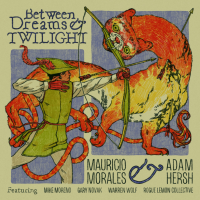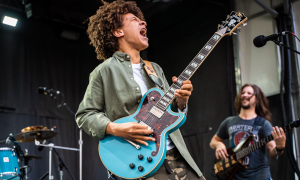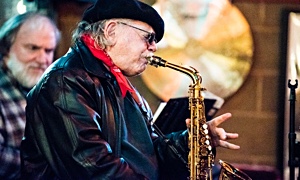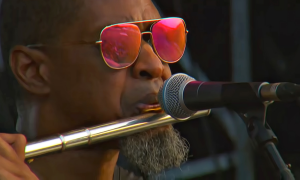Home » Jazz Articles » Talking 2 Musicians » Jazz Musicians Up Against A Virus
Jazz Musicians Up Against A Virus
This whole situation is humbling. I was supposed to go to Vegas and had a Bird with Strings concert scheduled in California and everything is gone. But the virus is a great equalizer. Madonna can't get any more gigs than I can.
—Richie Cole
Not only were musicians unable to perform, but in most cases they have been confined to their home. It seemed like a good time to reach out to them and see how they are doing. What follows are a few such conversations. I hope to be talking to more of them and others involved in the jazz industry for future issues.
Pianist Frank Puzzullo, who at 79 has traveled the world accompanying such distinguished performers as Dizzy Gillespie, James Moody and Branford Marsalis among others, settled in Charleston with hopes of continuing to play both as a leader and backing up other players. He has been heard recently with such stellar musicians as Lew Tabackin, Richie Cole and, most recently, saxophonist Greg Abate. He had nailed down a regular gig, playing solo piano at the Establishment on Broad Street in downtown Charleston.
"The virus doesn't impact me too much because I receive social security and a pension—it's a lot harder for some of the younger musicians," he told me.
But, like all jazz players, music is in his DNA. "I have a piano here and can practice. I am writing music for the August 19th Gibbs museum concert. Hopefully it won't get canceled. But I really miss being out and playing for people. I also miss teaching, which is out of the question because you can't have people in the house or in a music room."
Right now, he doesn't have anything else pending. He was scheduled to appear with star baritone saxophonist Gary Smulyan, but all three appearances were canceled.
Puzzullo is still maintaining an optimistic attitude and is just looking forward to it being over. In the meantime, he is spending his time playing for his partner, Donna, and catching up on some of the rising stars who have their performances on Youtube.
Jon Thornton, at 57, is one of the most successful freelance jazz musicians around town. Originally from Charlotte, he has played trumpet with a variety of top shelf musicians on the road before settling in Daniel Island. He may be best known for his tributes to his hero, Chet Baker, although he is a very well rounded performer.
"I had thousands of dollars of work that came off the books," he claimed. "Jazz gigs around town, wedding receptions. There are still dates on the calendar that are yet to called off."
The forced layoff already has him wondering if he should change his professional trajectory. "I try to stay positive, but I don't think I am going to limit myself to being a musician and teacher. Losing your entire livelihood is kind of scary. There are a lot of musicians that thought they were prepared for whatever came their way and obviously aren't. I have some friends who perform in pit bands on Broadway in New York or Las Vegas and they are freaked out."
As for coping with boredom and being cooped up—"I am doing some bike riding to get some fresh air and sunshine. I am also working on some arrangements for my band. I will also be working with my church in their efforts to offer virtual services."
While he is listening to some music, such as Peter Gabriel and Sting, he is frequently engaged in non music activities. "It is kind of fun to take a break from music and let your mind rest a little bit," Thornton said. "Hopefully, I'll come back a little fresher from it."
"Everybody's gigs are shut down. Everything is cancelled for the next couple of months—it sucks," affirms multi reed man Robert Lewis, who at 38 holds two of the most prestigious and demanding jobs that jazz has to offer in Charleston—director of the Charleston Jazz Orchestra and head of the jazz studies program at the College of Charleston.
Along with the above mentioned duties, Lewis teaches several classes. While the venue has changed, his teaching schedule has moved from the classroom to online. "I've had to learn to use a lot of technology. I'm a chalk board kind of guy and now I find I have to post video lectures on line."
Not one to just sit around and mope, Lewis is practicing a lot more than he had been as well as finding the time to listen to more classical music.
Anyone who has ever met Richie Cole knows that he is a bundle of positive energy and he is viewing the pandemic with an attitude bordering on optimism.
The 72 year old alto saxophonist had been a world traveler, performing through out the United States with Buddy Rich's band and with vocalist Eddie Jefferson as well with his own groups throughout Europe, Asia and South America for over 50 years. Now, in semi retirement, he lives peacefully in a suburb of Pittsburgh.
"I'm just laying low in my little piece of heaven," he exclaimed to me in a recent phone interview. "I have my one room apartment with a nice view and my piano. I'm just hanging out and as happy as can be. I'm just waiting for it to all blow over. I watch tv, water my plants, go out every once in a while for fresh air—I got it easy!"
Cole has a large and adoring fan base throughout the world and many have been sending him masks and sterilizers that he has in turn donated to a hospital.
"This whole situation is humbling," he observed. "I was supposed to go to Vegas and had a Bird with Strings concert scheduled in California and everything is gone. But the virus is a great equalizer. Madonna can't get any more gigs than I can."
Note: Richie Cole passed away on May 2nd, shortly after this interview, from causes unrelated to the virus.
Despite his physical isolation, Cole has an upbeat view of the future. "When it's over it's going to be like the roaring '20s," he speculated. "Especially the jazz guys. I know the first thing I will do is get a gig. I've been doing this gig in Pittsburgh called 'Sunday with Richie' and I'm sure that will pick up again. In the meantime, I have some projects to get to including a lot of writing. I'm currently working on a song called "Corona, Corona."
62 year old saxophonist, Jan (not her real name) was living and thriving in the burning core of jazz—New York City. The Big Apple. The place where jazz dreams are made. And then came COVID-19 and everything suddenly changed.
"I had to cut a California trip three weeks short," said Jan, who asked that her identity be disguised. "All my work has been canceled. All my gigs that I had lined up are gone. And teaching....I am just figuring out how to use Zoom so I can retain a few students."
Jan's experience in a commonly heard story in the usually bustling and hustling big city. Hundreds, and possibly thousands, of jazz musicians have migrated there, knowing it is the best region in the country to establish a reputation as a master jazz player. And now, those struggling, the newcomers and, like Jan, the well established players are all in the same boat. In New York City, Charleston, Chicago—everywhere there is a hushed silence where music once rocked their residents and tourists.
"Our lives are in flux," she said. "Some days seem like gloom and doom, while others seem to show some promise of opportunities. We are all wondering if our gigs will come back. The places we had played at are struggling to maintain themselves with streaming and other measures. We don't know which ones will be back after it's all over."
Jan hasn't left her apartment building in twenty days. She tries to maintain a healthy lifestyle by eating carefully and doing yoga exercises on line. She keeps her spirits up by staying in touch with friends through text messages and phone calls.
What seems to give her the most joy, and perhaps a sense of hope, is climbing up on the roof of her apartment house and joining the crowds cheering on health care workers and others who are providing services in these dire times every evening at 7pm.
75 year old Jack Wilkins is a veteran jazz guitarist, who has played in Buddy Rich's big band and small groups, and has recorded with such diverse players as Earl Hines, Eddie Daniels, Red Rodney, and Mike and Randy Brecker among others. He has recorded several critically acclaimed albums under his own name and is one of the most highly respected practitioners by other guitarists. But his reputation couldn't shield this New York City resident from the virus.
"A lot of musicians are really scuffling now," observed Wilkins. "So many of them live from gig to gig."
Wilkins has been getting by modestly because of his association with The Manhattan School of Music, his monthly social security checks and a small pension.
"I had a bunch of gigs that canceled," he said. "My students can't come over and teaching on line doesn't appeal to me. You need to connect to your student and look closely at their hands while they play. You hear them through a computer and it just doesn't sound right."
The timing for Wilkins was especially painful, because he had just put a quartet together, which included fellow guitarist Jeff Barone—a group that he felt very upbeat about. Now everything is on hold.
Wilkins says the whole atmosphere is a bit surreal, looking out the window on what is usually a busy street and seeing only an occasional passer-by. "It feels strange not going anywhere, doing anything. I miss things like going out to dinner or having someone over to the house."
Wilkins also misses playing for an audience. "I picked up the guitar three or four times, that's all," he said. "When I am not performing, I don't feel like practicing."
Wilkins outlook is not optimistic. "It strikes me that a lot of the venues that we depended on are going to be gone," he glumly stated. "There is going to be a big transitional period."
"Half of my students have stopped taking lessons until the virus ends," says 28 year old drummer Edwin G. Hamilton of Aiken, South Carolina. "I was a a musician for a funeral home. That has dried up. All of my concert for my own band are gone. I had a mini tour at the UN, a tribute to Joe Henderson in Columbia, a gig at Good Times in Savannah, recording sessions—all cancelled."
Despite these major setbacks, Hamilton, who has played and recorded with trombonist Wycliff Gordon and guitarist Frank Vignola, and performed in the Charleston area with guitarist Jack Wilkins and saxophonist Greg Abate, has a surprisingly upbeat view of his life under the thumb of COVID-19.
"It is what it is," he philosophizes. "I am a music minister at a church where we are live streaming our services. I've managed to save enough money to weather the storm. Even with three kids and a wife to support, I am able to get by so far."
As one who sees the proverbial glass as half full, he looks at the bright side of this new life. "I'm spending a lot of extra time with my family. This virus has taught me how to be a better dad and husband. The most beautiful thing is spending more time with my kids. I will also be using my down time to practice, and compose music, so that when we come out of this thing, I'll be ready to release another record. I also plan to read a good book and work out more."
Hamilton is closely connected with the other constituents of the Charleston area jazz musician community and he has seen and heard the devastation in some of their lives. He worries about their sinking into depression and hopes that they will take the steps necessary to maintain themselves.
"They have to get on line and fill out applications for the stimulus," Hamilton advises. "And they need to use their booking skills to recover the gigs that have been cancelled. They have to begin looking at the business side and do more than just play."
"As for me, I'm going to believe in God and wait this out," says Hamilton. "There is no end date on this yet, but I'll breathe a sigh of relief when they find a cure."
"I made a decision at the age of 21 that I could never live on music alone," declared 50 year old Todd Beals, a resident of Mount Pleasant, South Carolina.
Beals had performed weekly at The Refuge in Isle of Palms playing trumpet and flugelhorn (and an occasional vocal) with a trio as well as a variety of other jobs that came his way from time to time. But his main job is working with Global Sales, selling wireless internet access and that has seen him through these rough times so far.
"I still work forty hours a week and have our health insurance...but I may be next—layoffs are coming."
Like Hamilton, Beals struggles to look at the bright side. "I've had quality time with my children," he says. "I built a bicycle ramp with my son, I've been cooking more, being more careful about my diet, which allowed me to lose twelve pounds. I'm also practicing more and my chops are great."
Obviously, it's not all candies and nuts for the horn man. "To be honest, I'm very uninspired and I'm just treading water and waiting for it to end."
While some musicians are streaming their music and playing for on line tips, this doesn't appeal to Beals. "There are a lot of audio and lighting problems. I have some buddies doing full on concerts out of their garage. I guess that's better than doing nothing, but I'm not sure they earned anything. It was more of fulfilling a need to speak musically, to sing the blues and let the emotions out on camera. But this is in no way a viable revenue source or new business model."
He urges his fellow musicians to use the time to learn new tunes and keep practicing so they will be ready to play at their best when the time comes.
"Hopefully, we will all learn something from this experience," says Beals. "A lot of musicians are going to have to consider getting a side hustle. I personally think half of the jazz venues won't survive and those that do open will be struggling financially, and spending less on music. Even when they open, people may be afraid to go out to eat. And social distancing laws will allow less patrons in their building affecting revenues even more."
Tags
Frank Puzzullo
Dizzy Gillespie
James Moody
Branford Marsalis
lew tabackin
Richie Cole
Greg Abate
Gary Smulyan
Jon Thornton
Chet Baker
Peter Gabriel
Sting
Robert Lewis
Buddy Rich
Earl Hines
eddie daniels
Red Rodney
randy brecker
Jeff Barone
Edwin Hamilton
Joe Henderson
Wycliff Gordon
Frank Vignola
Todd Beals
PREVIOUS / NEXT
Support All About Jazz
 All About Jazz has been a pillar of jazz since 1995, championing it as an art form and, more importantly, supporting the musicians who make it. Our enduring commitment has made "AAJ" one of the most culturally important websites of its kind, read by hundreds of thousands of fans, musicians and industry figures every month.
All About Jazz has been a pillar of jazz since 1995, championing it as an art form and, more importantly, supporting the musicians who make it. Our enduring commitment has made "AAJ" one of the most culturally important websites of its kind, read by hundreds of thousands of fans, musicians and industry figures every month.


























